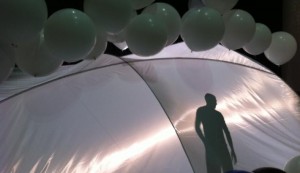Eva Diaz, ArtForum, October 1, 2014– You can’t swing a dead cat these days without hitting a reference to the “Anthropocene,” the term for what some argue is a new geological age caused by humans fucking up the environment. Philosopher Bruno Latour’s play Gaïa Global Circus—which had its US premiere at the Kitchen last week (it first played in September 2012 as part of Documenta 13 in Kassel)—invokes the Anthropocene to tackle hairy issues about who bears responsibility for global climate change, and what can possibly be done about it. Like the Civilians’ play The Great Immensity that was at the Public Theater earlier this year, Gaïa Global Circus finds the flimflam rhetoric of international climate change summits, in particular, a form of theater ripe for parody.
In the case of Latour’s work, the dissembling doublespeak of these events is converted into truly nonsensical babel. Adopting the convention of simultaneous translation in United Nations–style meetings, in one scene three actors render a speech being delivered in French into a cacophony of overlapping and therefore largely unintelligible Italian, English, and sign-language paraphrases. The signed hand gestures in particular undermine the portentousness of the male politician’s speech with vulgar caricature, the female signer (and isn’t it always women signing men’s speeches?) miming hand job and “I’m getting screwed” gestures, as if she was tuned into the repressive subtext of the speech’s bland ineffectiveness.
Sternly delivered warnings about imminent ecological catastrophe become like so much ham acting when such speeches defer any concrete action “pending further research” and insincerely affirm ultimately toothless “non-binding agreements.” By emphasizing the manner in which finding a political “balance” has stifled scientifically verified facts about ecological change, Latour pinpoints a central paradox that characterizes discussions about the Anthropocene. Though human exploitation of the environment has caused rising seas, melting ice caps, increased global temperatures, and a generalized sense of ecological insecurity, there are currently few remedies that could be implemented to decisive effect. The reality of climate change is in a way a kind of Lacanian real—the zone of the unspeakable and unrepresentable beyond human agency—that erupts into consciousness in spite of attempts to stifle it.
Latour’s use of the word “circus” in his title is literal: The play is composed of vignettes strung together under a big tent, in this case, a white fabric canopy held aloft by helium-filled balloons that the play’s actors manipulate by use of various weights. The stage is mostly dark and mostly empty throughout the play; other than a few props, the four actors must carry (pun intended) the entire production without the benefit of effective set design. The episodic structure of the production includes scenes that range from a reimagination of the divine commandment to Noah to build an ark—here stymied by a self-important bank officer refusing the prophet a loan—to a television debate in which a scientist’s attempt to communicate statistical information dissolves into sputtering stage fright when faced by the slick demagoguery of his opponent.
The lack of plot or character development gives Gaïa Global Circus an overlong feeling, as each new scenario requires exposition that saps the energy of the successful pieces. A violent scene early in the production, in which the actors fling hundreds of empty plastic water bottles around the stage, creates a powerful visual representation of the chaos unleashed by overproduction, abetted by the jarring sounds of stomped-upon plastic. The force of the scene is deflated when the actors abruptly stop “rioting” and begin to sweep up the mess, with no narrative context provided for the change. Because there is very little happening but for actors talking in French, the distracting placement of screens bearing English subtitles high above to the sides of the proscenium made it impossible to keep even a glance of the stage in sight while reading the dialogue. In spite of this, and the uninspired production design, the actors tried valiantly to hold the audience’s attention. Jade Collinet, who played the sign interpreter mentioned above, conveyed a captivating comedic energy throughout the production. In one seemingly tangential scene about a runaway teenager explaining the meaning of the Beatles song “She’s Leaving Home,” Collinet communicated some of the deep and almost laughable passion of adolescence, without a hint of the grandstanding that characterized some of the other actors’ approaches to the dozens identities they had to adopt and cast off.


 Follow
Follow